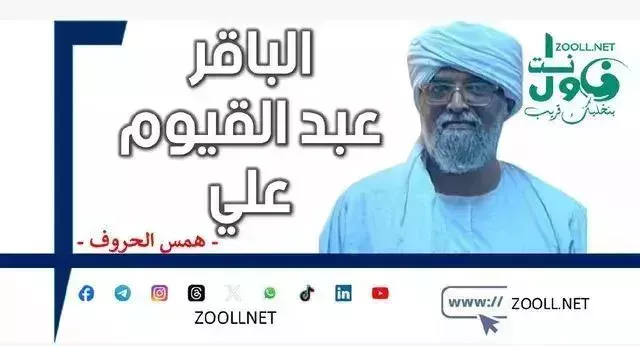War as a test of patriotism, the role of banks in supporting the economy and society during crises, the Bank of the Nile and the merit of honor – Hams Al-Horouf – ✍️ Dr. Al-Baqir Abdul Qayyum Ali

(Episode 1)
(1_2)
We all know very well that the banking sector in Sudan is the biggest loser in this war which targeted the existence of the state, and that the banks were the direct target of the militias. the militia implemented a systematic policy of destruction of vital infrastructure of the national economy. This behavior in the method of destruction followed by the militia is considered one of its main objectives in this war, and the proof is that the militia was not satisfied. with looting of money and deposits. Not only that, but their biggest concern was to destroy the information centers and digital systems that belong to customer accounts in banks. So we saw them destroying computer devices after being looted, and the main objective was to disrupt the supply of banking and financial services with the aim of destroying the life chances of citizens, increasing confusion and cause creative chaos in the country, but people showed a high degree of awareness and patience.
The population is fully aware of the enormous losses suffered by the banks following the looting and destruction of their facilities. This type of attack on financial institutions is considered one of the worst damages to hit the national economy. The banks have managed to overcome this ordeal. This disaster was successfully averted and banks continued to provide their financial services in safe states despite the severity of the crisis and heavy losses, thus overcoming all negative effects on the banking sector.
This war was a true test of the performance of the banks from the national perspective, through which it became clear the extent of their commitment to their national responsibilities in the face of the “crisis”, and in the midst of this disaster, the reality of the situation. The national commitment of financial institutions has become clear, and this has been clear and visible. To the extent that they were willing to support society and its economy apart from momentary financial gains, we see that the central role in such circumstances was to maintain the stability of the financial system and support vital sectors such as agriculture and industry, and that's it. It demonstrated the role of banks and their management teams according to national priorities, placing national interest above commercial profit, demonstrating the extent of real commitment to the role of some banks in preserving of the economy and the security of basic resources. needs of citizens.
We note here that the Nile Bank has been the most important of these banks, if not the only one, in its serious and immediate response aimed at supporting agricultural production and the needs of farmers in order to save the agricultural countryside in Gedaref State , considered the golden season to avert the specter of famine in the country, and we therefore see that it has played a pivotal role in ensuring much of the food security and remains committed to doing so.
On the other hand, we see that there are banks which have not been able to assume their national responsibilities. They have not contributed sufficiently or effectively to supporting the economy during this crisis. Most banks focused only on preserving their commercial interests without paying attention to those of the nation. needs, thereby avoiding the risks associated with providing any support to the economy in war-affected sectors, such as food security. This type of approach can reveal the weakness of the national commitment of certain banking institutions which preferred to maintain their financial situation to the detriment of supporting the national economy and were content with tawarruq alone.
The war was not just a military operation, but rather an economic crisis that complicated the banks' ability to provide appropriate support. However, banks who were deeply convinced of their responsibilities towards society made enormous efforts. to provide the necessary financing, even though they were faced with enormous financial challenges in these circumstances, at a time when banks were supposed to show their capacity to adapt to the situation, as did the Bank of the Nile and its management hawks led by MM. . Salah Mohamed Abdel Rahim and his two deputies: Mr. Hisham. Al-Tahami and Dr. Osama Al-Tayeb Al-Faki, with the help of other departments of the bank, who had the honor of saving the most important agricultural season for Sudan in circumstances that were and are still the most complex in the midst of a fierce war, and thus achieved remarkable success in ensuring the economic security of the country.
In the next episode… we will see how the state rewarded the Nile Bank and its leaders, how this Sudan is managed with this mentality, and how can such a thing happen in a country of contradictions?






